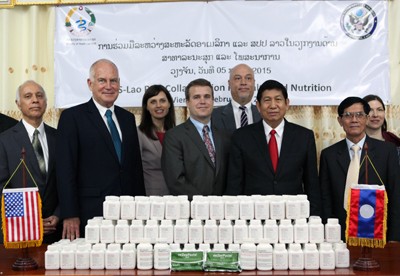
For Immediate Release
VIENTIANE, February 5, 2015 – The United States today announced plans to launch activities in the Lao People’s Democratic Republic (Lao PDR) to help reduce malnutrition rates and growth stunting in vulnerable communities through nutritional supplements, improved methods of feeding infants and young children, and better community sanitation.
“The support provided by the American people will help children in areas of Lao PDR to receive adequate nutrition and get a good start in life,” said U.S. Ambassador to Lao PDR, Daniel A. Clune. “A well-nourished child will perform better in school, develop a stronger immune system to fight off disease, and is more likely to become a productive adult, contributing more to the development of the country.”
The announcement coincided with a visit to Vientiane by Jason Foley, Deputy Assistant Administrator for Asia for the U.S. Agency for International Development, who traveled to the region to support this important new initiative. The program will promote community-based practices that lead to higher rates of exclusive breastfeeding, improved feeding practices for infants and young children, and elimination of open defecation and management of other sources of fecal contamination.
Despite recent economic growth in Lao PDR, the country experiences some of the highest rates of malnutrition in Southeast Asia. Forty-four percent of children under five are moderately to severely stunted, with numbers as high as 60 percent in certain provinces. These children have an increased risk of mortality, illness and infections, delayed development, cognitive deficits, poor school performance and reduced productivity as adults.
In October 2014, the U.S. provided $675,000 to the United Nations Children’s Fund to provide iron-folic acid and deworming tablets for pregnant and lactating women and ready-to-use therapeutic food supplements and deworming tablets for children under five, particularly from remote areas. In the second stage of assistance, subject to availability of funds, the U.S. intends to provide up to $6 million over two years and will work with other donors, partners and stakeholders on nutrition and hygiene interventions that align with USAID’s Multi-Sectoral Nutrition Strategy (2014-2025).
The new U.S. program will support Lao PDR’s increased focus on addressing stunting through its Multi-Sectoral Food and Nutrition Security Action Plan 2014-2020 and the establishment of a National Nutrition Committee to oversee its implementation. The Scaling Up Nutrition Civil Society Alliance, a formal network that coordinates international nongovernmental organization and local nonprofit association resources and aligns strategies with Lao policies, is also active.
Malnutrition is the single largest underlying cause of child mortality in Laos, contributing to an estimated 45 percent of all child deaths. This translates into a high economic cost, as stunting ultimately undermines the country’s economic development. Only 40 percent of mothers in Laos breastfeed exclusively for the first six months of their children's lives, and a lack of diversified diets also contributes to malnutrition. Focusing on the 1,000 days from pregnancy to a child’s second birthday—the most critical time for a child’s cognitive, intellectual and physical development–and teaching breastfeeding practices, appropriate complementary feeding, and improved hygiene, will help decrease chronic malnutrition.







Comment
Make a general inquiry or suggest an improvement.